By Geoffrey Smith
Investing.com --Tradition has it that the biggest rewards in finance go to fast movers. Vivendi’s spinoff of Universal Music Group - whose stable of artists ranges from Ariana Grande and Billie Eilish to Andrea Bocelli - might be the exception that proves the rule.
The French conglomerate has dragged out the sale process for over three years, a period in which the worldwide adoption of streaming as the medium of choice for music consumers has driven a real transformation of UMG’s business and prospects.
It’s now being paid handsomely for its procrastination.
Even though the development has been in the works for what seems like an eternity, the news, released at the weekend, was still able to push (PA:Vivendi's) stock sharply higher in Paris on Monday. Having struggled for weeks with resistance around its pre-pandemic high, the stock surged over 16% to a new record high by midday in Europe.
Vivendi (OTC:VIVHY) expects to distribute 60% of UMG shares to its shareholders in the form of a special dividend by the year end, a move aimed at unlocking as much value as possible for shareholders while reducing its own capital gains tax liability.
It’s looking at a valuation of at least 30 billion euros ($36 billion), roughly in line with the price that it has extracted from Tencent (NYSE:TME) for two successive 10% blocks. The second of those sales came in December last year, raising the Chinese company’s stake to 20%.
Intriguingly, in Saturday’s statement, the company referred to “interests expressed by other investors at potentially higher prices.” That doesn’t seem impossible, given that rival Warner Music (NASDAQ:WMG), with just over half of UMG’s revenue, is valued at $15.9 billion.
The proceeds from the sale to Tencent, plus the higher value of its remaining stake in UMG, will allow Vivendi to go ahead with buybacks that it has promised for a long time. It’s also talking about acquisitions again, although it gave no details in Saturday’s press release.
What’s left of Vivendi after the spin-off is likely to be of little interest to non-French investors: the 30 billion euro valuation ascribed to UMG accounted for nearly 90% of the conglomerate’s value as of Friday’s close, despite representing only 45% of sales. Despite signs of progress at its Canal+ TV unit, neither it nor the Havas communications company has anything like the same earning power.
The newly-listed company will be quoted on the Amsterdam stock exchange, which a Financial Times article last week suggested had been the main beneficiary of European investors moving their liquidity out of London since the Brexit transition period ended.
